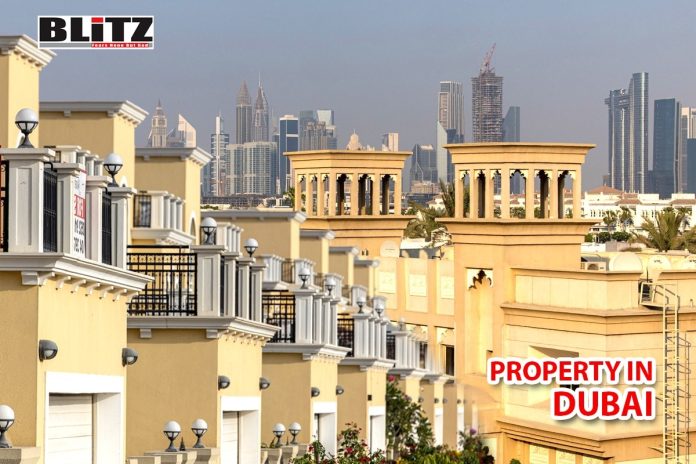Since the onset of Russia’s Special Military Operations in Ukraine in 2022, Russian nationals have dramatically increased their investments in Dubai real estate. A recent report by economists from the EU Tax Observatory and Norway’s Centre for Tax Research estimates that Russian nationals have purchased US$6.3 billion worth of properties, both existing and under development, in Dubai. This figure marks a more than tenfold increase in Russian investment compared to previous years.
The influx of Russian capital into Dubai’s property market has been documented before, but newly leaked records from 2022 provide a clearer picture of its extent. These records were obtained through Dubai Unlocked, a collaboration led by the International Consortium of Investigative Journalists (ICIJ), Norwegian financial outlet E24, and the Organized Crime and Corruption Reporting Project, involving over 70 media partners.
The six-month investigation into the UAE’s booming and secretive property market uncovered how various individuals, including politicians, alleged criminals, and suspected sanctions evaders, have purchased real estate in some of the most exclusive neighborhoods in the Middle East. Notable figures include “cryptoqueen” Ruja Ignatova and accused drug kingpin Daniel Kinahan.
The economists’ report, co-authored by Annette Alstadsæter, Matthew Collin, Bluebery Planterose, Gabriel Zucman, and Andreas Økland, presents updated estimates of foreign-owned real estate for the years 2020 to 2024, utilizing both the leaked data and additional transaction records. “We estimate that the amount of Russian money flowing into Dubai real estate has increased more than tenfold following the invasion of Ukraine,” said Matthew Collin, senior researcher at the EU Tax Observatory. “This illustrates how the city became a prime destination for elite Russians evading sanctions or escaping the war itself.”
Of the US$6.3 billion worth of residential properties purchased, US$2.4 billion were existing properties, while US$3.9 billion were still under development. The report considers these figures conservative estimates. Among the investors were key figures in Russian politics, state companies, and businesses, as well as colorful characters like the spy Anna Chapman. Chapman, who was arrested in New York in 2010 for espionage and later involved in a prisoner exchange between the US and Russia, purchased an apartment in Dubai for US$566,000 early in 2022. She had promoted property investments in Dubai to her Russian followers on Instagram shortly before her purchase.
In March 2022, less than a month after Russia’s full-scale invasion of Ukraine began, one of the wealthiest deputies of the Russian State Duma, Grigory Anikeev, purchased a US$13 million penthouse in the exclusive Serenia Residences on the Palm, according to IStories and available transaction records. In April 2022, Irina Kupareva, Anikeev’s former partner and the mother of one of his sons, also acquired a 140-square-meter apartment in the same Serenia Residences complex. The apartment was rented out for US$84,000 a year. Olga Poliakova, the mother of another of Anikeev’s sons, owns two properties in Dubai worth a total of US$3 million, according to reports by IStories and The Times of Malta.
The property records from 2022, obtained through the Dubai Unlocked investigation, list 5,000 Russian citizens and companies as owners of 6,600 residential properties in Dubai, worth an estimated US$3.3 billion. Additionally, several Russian citizens appear in the data with other nationalities and passport numbers, indicating that multiple citizenships are being used to evade scrutiny.
The economists estimated that total Russian investment in Dubai residential real estate reached US$4.8 billion in 2022, even higher than what the leaked data revealed. This makes Russians the seventh-largest group of foreign owners of residential property in Dubai. In 2020, foreign nationals owned approximately US$98 billion worth of Dubai residential real estate. By 2022, this figure had jumped to US$121 billion, representing 43% of the total value of all residential real estate in the city, higher than any other city in the world with available estimates. Foreign nationals also owned US$39 billion in properties under development by 2022.
The substantial foreign investment in Dubai’s real estate market poses a significant “money laundering vulnerability,” the report warned. “It is well known that real estate is one of the sectors that is prone to money laundering and that requires most attention and due diligence”, said EU parliamentarian Markus Ferber, a deputy chairman of the parliament’s subcommittee for tax matters. “It seems Dubai has made it a business case to look the other way”.
The scale of foreign investment in Dubai has implications not only for the emirate but also for other governments, as it creates a major blind spot for foreign tax authorities. For instance, about 70 percent of Dubai properties owned by Norwegian taxpayers were not reported for tax purposes in 2019, according to a previous report.
In response to the findings, an official with the UAE’s British embassy stated in an email to ICIJ’s U.K. media partner, The Times, that the “UAE takes its role in protecting the integrity of the global financial system extremely seriously” and that the country “works closely with international partners to disrupt and deter all forms of illicit finance”.
The report proposes three policy recommendations to combat the flow of suspicious funds through Dubai real estate. First, it suggests including real estate in automatic-exchange-of-information reporting agreements, such as the OECD’s Common Reporting Standard, which requires jurisdictions to collect and share information from their financial institutions with each other. Second, the economists recommend creating a global assets registry to help track wealth, property, and other assets, identifying their true owners. Finally, they call for renewed international pressure on the UAE to clean up its real estate sector.
“Increasing international collaboration and exchange of information makes it harder to hide money in foreign banks,” said Annette Alstadsæter, a professor of economics and program director at the EU Tax Observatory. “But real estate remains a blind spot and a means to hide assets from the authorities”.




